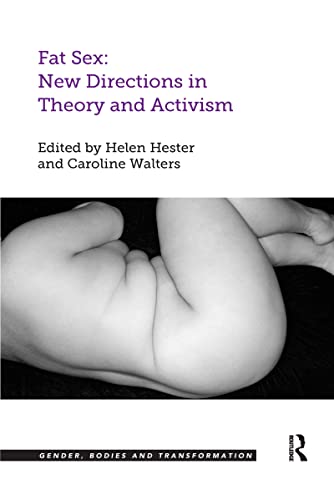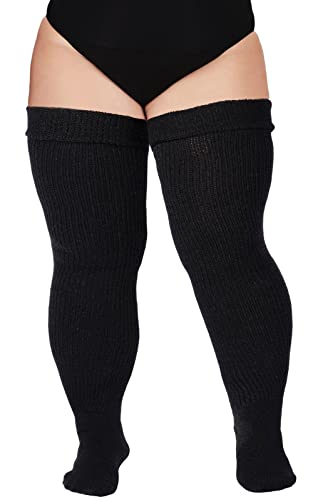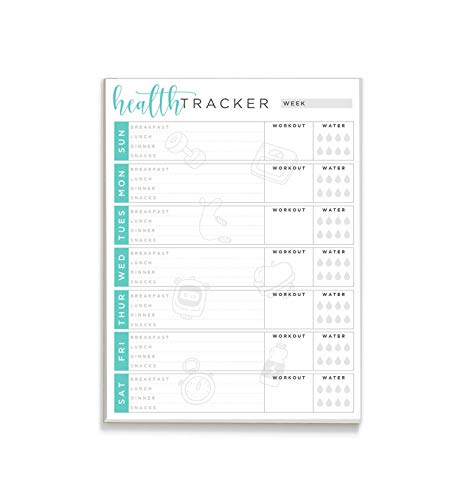FatAndProud
Well-Known Member
This is fantastic. A news piece on a highly trafficked news venue. I'm lovin' it. It seems positive, as well. ETA: Ignore the comments on the article...ugh.
View attachment 101062
Without fail at noon on every Friday, 30 minutes before my beginning ballet class starts, a mixture of fear and dread ooze into my mind. It starts when I think of getting dressed for class. Despite a well-stocked closet, I am never content with my choices. I spend 20 minutes scouring my closet for a garment that doesn't exist - I am looking for something that will make me invincible. Exasperated, I leave wearing the same men's gym shorts and oversized t-shirt. My nerves don't get any better once I get to class. I am scared to look at my body in a mirror; I am scared to compare my body to my peers. I try to stand in the back rows as far away from the mirrors as possible, and I still occasionally catch a glimpse of my double chin. Or my belly escaping the drapery of my shirt. I am scared that even after working at accepting my body and fighting tooth and nail to get those around me to change their actions and opinions, I will see something repulsive. I can't get through a weekly dance class without having to give myself pep talks. It takes all that I can muster to remind myself that I am beautiful and, more importantly, worthy of being in that class. It takes all that I have to remind myself that I love my body and that I can take pleasure in moving it. I can take pleasure and find beauty in my body.
I loathe classifying these problems (yes, I acknowledge that they're problems) as "body image" problems. "Body image" isn't really about the image of bodies. It's about the holistic relationships we have with our bodies. It's about how bodies look, how they move, what they feel like, and how we treat them. Even if we ignore semantics, conversations about body image almost always come down to health. Most conversations I've had about body image blame the media and advertising for exposing young girls to impossible standards in order to sell products. But more than selling products, these images drive people to unhealthy habits - crash diets, disordered eating, and sometimes even more dramatic actions like diet pills and self-harm.
And yet many of these behaviors have been recommended to me by health professionals. You see, I'm fat. Not "does this dress make me look fat?" fat, but eligible-for-weight-loss-surgery morbidly obese deathfat. I've been fat for as long as I can remember, but the first time I remember my size being an issue was at a check-up. I was 8 years old, and after plotting my height and weight in one of those grids, my pediatrician had one of those "talks" with my parents and me. I was too heavy for my height and age, so he presented me with a Xeroxed list of 10 "helpful tips" for eating.
It was meant to be innocuous, but I became obsessed with that sheet of paper. It was the first time I saw my body as a personal failing, and that list was the way to redeem myself. I followed the rules to a tee, and yet I didn't get any smaller. That simple piece of paper was only the beginning. My adolescence was filled with appointments with doctors and nutritionists, medically facilitated crash diets, and crying fits in dressing rooms. My doctors pathologized my body, and I believed them. I believed that my fat body meant that I was overeating, even when I would leave the dinner table hungry. I believed that I was lazy, unkempt, untrustworthy. I couldn't trust myself.
I can't rely on a conventional understanding of health to fix my body image issues because my body image issues stem from those conventional understandings of health. To find peace with my body I've had to reject mainstream medical wisdom. I screen my health care professionals, and I set firm boundaries. I am not interested in weight loss, and I will not step on a scale. I don't care about a new diet regimen; I care about eating. I've learned to love my body - I love the look of my body; I love the way my squishy, soft flesh feels. I have embraced my fat. I do this because I care about my body. I care less about the image of my body, and I care more about my relationship to my body.
When I stand at the barre to begin my weekly ballet class, I am reminded that loving my body is both difficult and important. As we go through the usual warm-up routine I feel my muscles stretch and flex. I am present in my body, and I appreciate the grace and flow of movements. As we transition into leaps and jumps, I am reminded of that power in my body. My hearty legs can push my body in the air again and again in rapid succession. I land easily each time.
I am still scared that even after working to accept my body I will catch a glimpse of myself in the mirror and find something ugly. So far, I've only seen my body. My fat, beautiful body.
When Jenn Leyva was 16, her dad told her that he'd buy her a car if she lost weight. She cried, finished her calculus homework, and is now a New York based fat activist and a senior at Columbia studying biochemistry. She authors Fat and the Ivy, a fat blog about social justice, feminism, science, health, and fa(t)shion.
View attachment 101062
Without fail at noon on every Friday, 30 minutes before my beginning ballet class starts, a mixture of fear and dread ooze into my mind. It starts when I think of getting dressed for class. Despite a well-stocked closet, I am never content with my choices. I spend 20 minutes scouring my closet for a garment that doesn't exist - I am looking for something that will make me invincible. Exasperated, I leave wearing the same men's gym shorts and oversized t-shirt. My nerves don't get any better once I get to class. I am scared to look at my body in a mirror; I am scared to compare my body to my peers. I try to stand in the back rows as far away from the mirrors as possible, and I still occasionally catch a glimpse of my double chin. Or my belly escaping the drapery of my shirt. I am scared that even after working at accepting my body and fighting tooth and nail to get those around me to change their actions and opinions, I will see something repulsive. I can't get through a weekly dance class without having to give myself pep talks. It takes all that I can muster to remind myself that I am beautiful and, more importantly, worthy of being in that class. It takes all that I have to remind myself that I love my body and that I can take pleasure in moving it. I can take pleasure and find beauty in my body.
I loathe classifying these problems (yes, I acknowledge that they're problems) as "body image" problems. "Body image" isn't really about the image of bodies. It's about the holistic relationships we have with our bodies. It's about how bodies look, how they move, what they feel like, and how we treat them. Even if we ignore semantics, conversations about body image almost always come down to health. Most conversations I've had about body image blame the media and advertising for exposing young girls to impossible standards in order to sell products. But more than selling products, these images drive people to unhealthy habits - crash diets, disordered eating, and sometimes even more dramatic actions like diet pills and self-harm.
And yet many of these behaviors have been recommended to me by health professionals. You see, I'm fat. Not "does this dress make me look fat?" fat, but eligible-for-weight-loss-surgery morbidly obese deathfat. I've been fat for as long as I can remember, but the first time I remember my size being an issue was at a check-up. I was 8 years old, and after plotting my height and weight in one of those grids, my pediatrician had one of those "talks" with my parents and me. I was too heavy for my height and age, so he presented me with a Xeroxed list of 10 "helpful tips" for eating.
It was meant to be innocuous, but I became obsessed with that sheet of paper. It was the first time I saw my body as a personal failing, and that list was the way to redeem myself. I followed the rules to a tee, and yet I didn't get any smaller. That simple piece of paper was only the beginning. My adolescence was filled with appointments with doctors and nutritionists, medically facilitated crash diets, and crying fits in dressing rooms. My doctors pathologized my body, and I believed them. I believed that my fat body meant that I was overeating, even when I would leave the dinner table hungry. I believed that I was lazy, unkempt, untrustworthy. I couldn't trust myself.
I can't rely on a conventional understanding of health to fix my body image issues because my body image issues stem from those conventional understandings of health. To find peace with my body I've had to reject mainstream medical wisdom. I screen my health care professionals, and I set firm boundaries. I am not interested in weight loss, and I will not step on a scale. I don't care about a new diet regimen; I care about eating. I've learned to love my body - I love the look of my body; I love the way my squishy, soft flesh feels. I have embraced my fat. I do this because I care about my body. I care less about the image of my body, and I care more about my relationship to my body.
When I stand at the barre to begin my weekly ballet class, I am reminded that loving my body is both difficult and important. As we go through the usual warm-up routine I feel my muscles stretch and flex. I am present in my body, and I appreciate the grace and flow of movements. As we transition into leaps and jumps, I am reminded of that power in my body. My hearty legs can push my body in the air again and again in rapid succession. I land easily each time.
I am still scared that even after working to accept my body I will catch a glimpse of myself in the mirror and find something ugly. So far, I've only seen my body. My fat, beautiful body.
When Jenn Leyva was 16, her dad told her that he'd buy her a car if she lost weight. She cried, finished her calculus homework, and is now a New York based fat activist and a senior at Columbia studying biochemistry. She authors Fat and the Ivy, a fat blog about social justice, feminism, science, health, and fa(t)shion.









































![BodyJewelryOnline MECO (TM) Plastic Tattoo Machine Ink Cups Caps [200 Pieces], Ink/Pigment Holder, Sizes: Small/Large, Translucent Plastic Material, Waterproof, Cleanable, Long-Lasting](https://m.media-amazon.com/images/I/41dQOkFmObL._SL500_.jpg)




























